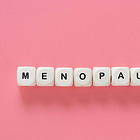The brain fog slog
When you're somewhere between over it and acceptance, but still second-guessing whether it's even perimenopause.
After months of living with brain fog, I’m no longer using words like “battling,” “fighting,” or “dealing with” before it. I haven’t totally given up; I’m still trying new things, but I’ve reached a stage of quasi-acceptance, even as I continue second-guessing practically everything about perimenopause, including whether I’m even in it.
But first, a life update
I’m kinda-sorta, after months of writing about it, maybe officially in the ‘pause? After having clockwork-like, every-28-days cycles (±2 days) for practically my whole life, I’ve now had two totally catawampus periods. The first came at day 22, a full period, in case you’re wondering. My next period was five days late.
So what, you irregular-all-your-life people say? This proves nothing. Plus, it’s not even considered a missed period until it’s seven days late.
But wait, there’s more!
I had my first hot flash this week. Hubs and I were driving back from dinner, where we sat outside on a patio, enjoying breezy 70-degree temps. I was wearing shorts, but it was chilly enough that I needed a light sweater. Halfway home, a blast of heat hit me from the inside. I was hot and nauseous, all at once. It was the same out-of-body feeling I had that one time in church during pregnancy when I locked my knees while standing and then fainted. My eyes locked on the car temp. It was set to 65.
"Is it hot in here?" I asked my husband, regretting the sweater.
"No," he said.
"I think I’m having a hot flash."
It was like he had been training for this moment his whole life—no questions asked. He immediately hit the button that turns the AC to full blast, which normally feels like a full sensory assault. This time, it was like it was on mute. I sat there dazed, feeling totally out of sorts. And then—poof—the feeling was gone.
And now back to the brain fog saga
For the last six months, I’ve felt a bit like an imposter, struggling to pin down the cause of my brain fog—so thick at times it felt like my thoughts were wading through honey. I had been diagnosed with inattentive ADHD in June of last year, at age 49, but something still didn’t add up. ADHD is something you’re born with; these symptoms—the brain fog, the sluggish thinking—felt new.
When someone first suggested perimenopause, I dismissed it. I was still having regular periods. But the idea lingered, even as I explored ADHD meds. When they didn’t work, I started digging deeper. That’s when I stumbled across research showing that many women experience perimenopause symptoms before they ever miss a period. But I still had doubts. Was I actually in it? Was it all just in my head? (Does anybody else do this??) I was desperate for something that made sense.
Because there’s so little research on menopause and no definitive test to confirm perimenopause (hormones fluctuate so much during this time that blood tests aren’t reliable), we’re often left second-guessing ourselves and forced to become experts on our own bodies. It doesn’t help that symptoms can be all over the place—some creep up so gradually we barely notice them, while others seem to show up overnight and knock us sideways.
After ADHD meds didn’t work, I moved on to hormone therapy. Within two weeks of starting estradiol and progesterone, the strangest thing happened. No, the brain fog didn’t go away, but all the random ailments and strange body changes I had chalked up to aging or burnout that had crept in over the last few years suddenly vanished.
My 3 a.m. wake-ups drenched in sweat disappeared, along with the anxiety that followed. And the carpal tunnel in my right hand? The one I never imagined could be linked to estrogen loss? Gone. Turns out they were all symptoms of perimenopause.
I was relieved and hopeful. There were finally answers that made sense.
But I still couldn’t fix my memory loss, confusion, and difficulty concentrating.
The fallout
I won’t sugarcoat it: the brain fog of the last couple of years has been a gigantic pain in my ass.
It’s caused real problems. I’ve almost lost friendships over it (I’ve definitely damaged relationships). I’ve lost money. I’ve missed deadlines. Missed appointments. Lost wallets and keys—some of which were never recovered. I’ve gotten dates completely wrong. I totally missed the text confirming my friend was going to make a fabulous, over-the-top cake for another friend’s 50th birthday, so I went ahead and booked someone else.
It now takes me twice as long to write and edit this newsletter you’re reading than it did a year ago. It’s a real struggle to juggle writing and promoting this newsletter, let alone work on my book, and tackle all the domestic work. Every day, I wonder, how the hell did I ever manage three kids and a full-time job as a single mom? I couldn't do it now.
Many women report that HT improves brain fog, so I’ve been tracking my symptoms closely and steadily increasing my dose when needed. But even with all the improvements I’ve seen in other areas, HT hasn’t touched the brain fog.
Semi-acceptance
For now, I’m holding out hope that I just haven’t found the right dose. Maybe the symptoms will fade as I get further into menopause. Maybe they won’t.
I’ve come to a place of semi-acceptance: It’s possible I will never get better. It’s frustrating as hell, and it has forced me to make major adjustments to my life, my organization, and my work.
I’ve had to pull back on certain things. Keeping a schedule helps. Structure makes a difference. But I’m also prepared to live with it if I have to.
That doesn’t mean I’m going to stop looking for solutions.
Instead of sort of nudging me toward a more disciplined life, it’s like brain fog has taken a hammer to my head with one singular message. No, you will not continue down the path you were on. You need to take inventory of every single activity in your life and decide whether it’s absolutely necessary. Because every extra thing you take on will cost you. If it’s not important, you’ve got to let it go.
I’ve had to strip back to just the necessities, and most days even those are a struggle.
Thanks, menopause.
But on the plus side, I’m more in tune with my body than ever.
Two weeks ago, I hopped in the shower and noticed my hair was feeling thin again. A few days later, while rolling off my sofa, I noticed my joints were hurting again. (Don’t judge. I inherited one of those Restoration Hardware Cloud sofas that sit so low to the ground, you have to execute a full-body maneuver just to get up.)
It’s time for another estradiol bump, I thought. Plus, the hormones still haven’t fixed the brain fog.
Still, I put off messaging my doctor, stuck in my usual cycle of second-guessing.
Until the hot flash.
It was the final confirmation: No more second-guessing yourself, girl. You’re in it.
Now it’s your turn. For those of you in perimenopause or post-menopausal—did you wrestle with self-doubt about your symptoms? How did you know it was time to increase your hormones? What symptoms told you it was time? What dose ended up being your sweet spot? And for the doctors and experts out there, what advice do you give your own patients?
P.S. – If this post resonated with you, would you consider restacking it and sharing it with your audience? 🔄
It helps more people find this conversation and supports my ability to keep writing about navigating midlife, perimenopause, and body acceptance. 💙








Welcome to the club. All the best women are here.
Apparently Vitamin B12 and Magnesium are good for brain health... I started taking Magnesium a few months ago (to aid sleep) and I definitely feel sharper/less forgetfull 👍 But then again that could just be due to sleeping better! 🤣 Either way.. Magnesium might be helpful x